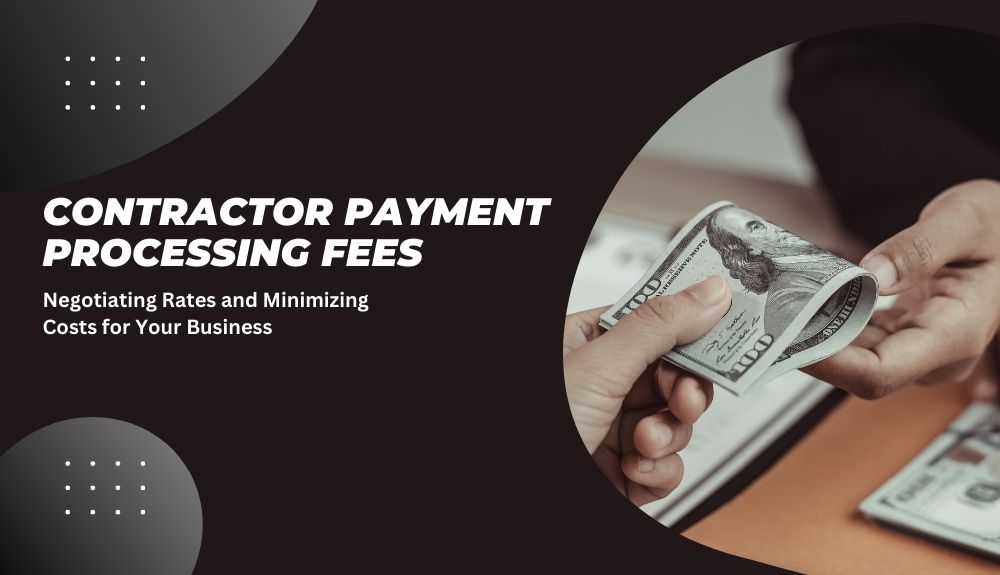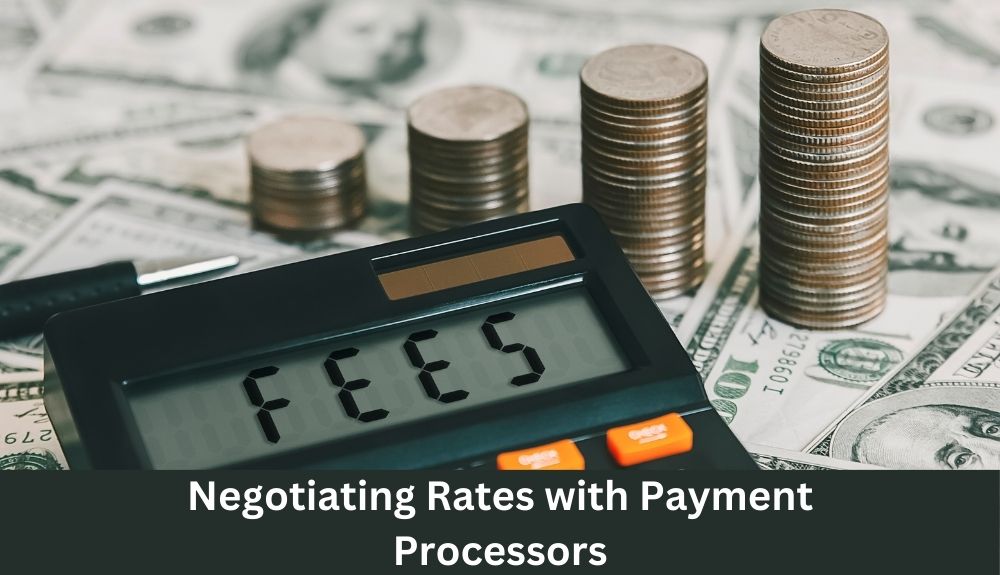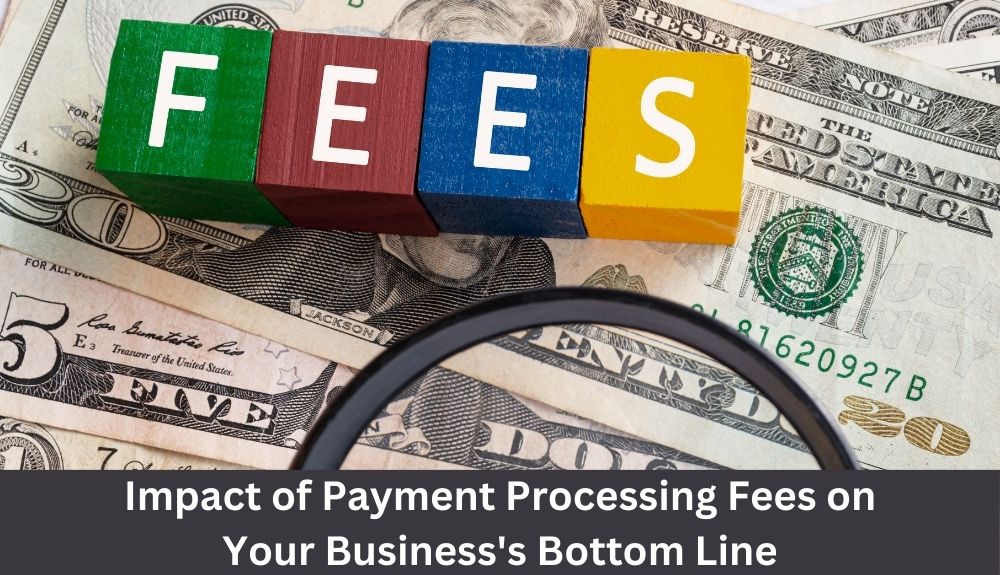
By alphacardprocess February 9, 2024
Welcome to the world of contractor payment processing fees! As a business owner, you understand the importance of accepting payments efficiently and securely. But have you ever taken a closer look at the fees associated with processing those payments? If not, it’s time to dive in and uncover the secrets behind these charges.
In this blog post, we’ll explore everything you need to know about contractor payment processing fees. From understanding common types of fees to negotiating rates with payment processors, we’ve got you covered. Plus, we’ll share some valuable tips on how to minimize these costs for your business.
So grab a cup of coffee (or your beverage of choice) and get ready to become an expert in navigating payment processing fees like a pro. Let’s begin our journey into this often overlooked aspect of running a successful contracting business!
Common Types of Fees and How They Work
When it comes to contractor payment processing fees, understanding the different types of fees and how they work is crucial for managing your business’s financial health. Let’s take a closer look at some common types of fees you may encounter when utilizing payment processors.
First, there are interchange fees, which are charged by credit card networks like Visa or Mastercard. These fees vary based on factors such as the type of card used (debit, credit, rewards), transaction volume, and industry. Interchange fees can range from around 1% to 3% per transaction.
Another fee to be aware of is the flat rate fee. This fee structure charges a fixed percentage per transaction regardless of the type or value of the purchase. While convenient and easy-to-understand, flat rate fees may not always be the most cost-effective option for businesses with high-value transactions.
Additionally, some payment processors may charge monthly subscription or service fees to cover their operational costs. These ongoing expenses could include access to additional features or customer support services.
Keep an eye out for incidental charges such as chargeback fees or foreign transaction fees that can further impact your bottom line.
Understanding these common types of payment processing fees will help you make informed decisions about which processor best suits your business needs and budget. Remember to review multiple options before committing to ensure you’re getting favorable rates tailored specifically for contractors!
Negotiating Rates with Payment Processors

When it comes to contractor payment processing fees, one of the most crucial factors to consider is negotiating rates with your chosen payment processors. By doing so, you have the opportunity to minimize costs and save money for your business. But how can you effectively negotiate these rates?
It’s important to understand that payment processors are businesses too. They want your business, but they also want to make a profit. With this in mind, start by researching different payment processors and compare their fee structures.
Once you have a clear idea of what options are available in the market, reach out to several providers and express your interest in working together. Remember that negotiation is a two-way street; be open about what you’re looking for and listen carefully to their offers as well.
Don’t be afraid to ask questions about specific aspects of their fee structure or any additional services they may offer. This will help you gain a better understanding of each processor’s terms and conditions.
Keep in mind that negotiation doesn’t always mean getting the lowest rate possible; it’s about finding a balance between cost-effectiveness and quality service. Be prepared for some back-and-forth discussions before reaching an agreement that satisfies both parties.
In addition to negotiating rates directly with payment processors, consider discussing volume-based discounts or long-term contracts if applicable. Some providers may be willing to offer more favorable terms if they see potential for ongoing partnership or increased transaction volumes from your business.
Remember that every negotiation is unique; there is no one-size-fits-all approach when it comes to securing advantageous rates with payment processors. The key is being proactive, informed, and assertive during negotiations while keeping the best interests of your business at heart.
By successfully negotiating lower rates or beneficial terms with your chosen payment processor(s), you can significantly reduce contractor payment processing costs over time – ultimately increasing profitability for your business!
Tips for Minimizing Payment Processing Costs for Your Business
When it comes to minimizing payment processing costs for your business, there are several strategies you can implement. One effective tip is to shop around and compare rates from different payment processors. By doing this, you can ensure that you are getting the best possible deal for your business.
Another tip is to negotiate with payment processors to try and secure lower rates or fees. Don’t be afraid to ask for a better deal or explore options like volume discounts if your business processes a large number of transactions.
Consider implementing measures that can help reduce the risk of chargebacks, such as improving customer service and clearly communicating refund policies. This can help minimize the need for costly chargeback fees.
Additionally, take advantage of technology solutions that offer cost-saving benefits. For example, using an integrated payments platform can streamline operations and potentially save on processing fees in the long run.
Regularly review your payment processing statements to identify any unnecessary fees or hidden charges. It’s important to stay vigilant and make sure you’re not paying more than necessary for these services.
By following these tips and staying proactive in managing your payment processing costs, you can effectively minimize expenses while still providing convenient payment options for your customers.
Alternative Payment Methods for Contractors
As a contractor, it’s essential to consider alternative payment methods that can help you save money on processing fees and provide more convenience for your clients. Here are some options:
1. ACH Transfers: Automated Clearing House (ACH) transfers allow you to electronically transfer funds between bank accounts. This method is not only cost-effective but also secure and reliable.
2. Mobile Payment Apps: With the rise of smartphones, mobile payment apps like PayPal, Venmo, or Square have become popular choices for contractors. They offer easy-to-use interfaces, quick transactions, and often lower processing fees compared to traditional methods.
3. Digital Wallets: Digital wallets such as Apple Pay or Google Pay enable contractors to accept payments through contactless technology. These wallets securely store credit card information and streamline the payment process by eliminating the need for physical cards.
4. Cryptocurrencies: Although still relatively new in the world of contracting, cryptocurrencies like Bitcoin or Ethereum are gaining traction as alternative payment methods due to their decentralized nature and potential cost savings.
5. Wire Transfers: While wire transfers may incur higher fees than other options, they remain a viable choice for large-scale projects where immediate funds are required.
6. Bartering Services: In certain situations where both parties agree, bartering services can be an unconventional yet effective way of conducting business without any monetary exchange involved.
By considering these alternatives alongside traditional credit card payments or checks, contractors can diversify their payment options while potentially minimizing costs associated with transaction fees imposed by processors.
Impact of Payment Processing Fees on Your Business’s Bottom Line

Payment processing fees may seem like a small detail in the grand scheme of running your contracting business, but they can have a significant impact on your bottom line. These fees can eat into your profits and affect your cash flow if you’re not careful. It’s essential to understand how these fees work and take steps to minimize them.
When you accept payments through credit cards or online platforms, payment processors charge certain fees for their services. These fees are usually a percentage of the transaction amount, plus a flat fee per transaction. While these costs may appear small individually, they can quickly add up over time.
For example, let’s say you have an average project value of $10,000 and process ten payments per month with an average fee rate of 2.9% + $0.30 per transaction. In one year alone, you could be paying around $3,600 in payment processing fees!
To mitigate the impact on your bottom line, it’s crucial to negotiate rates with payment processors whenever possible. Many processors are willing to offer lower rates for high-volume businesses or those with excellent credit history.
Another way to minimize payment processing costs is by being strategic about which payment methods you offer clients. Some methods incur higher fees than others; for instance, accepting credit card payments typically comes with higher charges compared to bank transfers or ACH payments.
Consider exploring alternative payment methods that come with lower processing costs but still provide convenience for both you and your clients.
Understanding and managing payment processing fees is vital for optimizing profitability in your contracting business.
Conclusion
Understanding and effectively managing contractor payment processing fees is crucial for any business that relies on contractors for their services. By familiarizing yourself with the common types of fees and how they work, you can make informed decisions when choosing a payment processor. Additionally, negotiating rates with payment processors can help you secure more favorable terms that align with your budget.
To minimize payment processing costs, consider implementing some cost-saving strategies such as reviewing your pricing structure, optimizing your billing processes, and exploring alternative payment methods like ACH transfers or digital wallets. These small changes can add up to significant savings over time.
It’s important to remember that while payment processing fees are an unavoidable aspect of doing business, taking proactive steps to manage these costs can have a positive impact on your bottom line. By finding ways to negotiate lower rates and minimize expenses associated with processing payments, you’ll be able to maximize profitability without compromising the quality of service provided by your contractors.
In conclusion, understanding contractor payment processing fees requires knowledge about the different types of fees involved in order to negotiate better rates and minimize costs for your business. With careful consideration and implementation of cost-saving strategies, you can optimize your contractor payments process while maintaining financial stability within your organization. So take control of this aspect of running a successful contracting business and watch the benefits unfold!